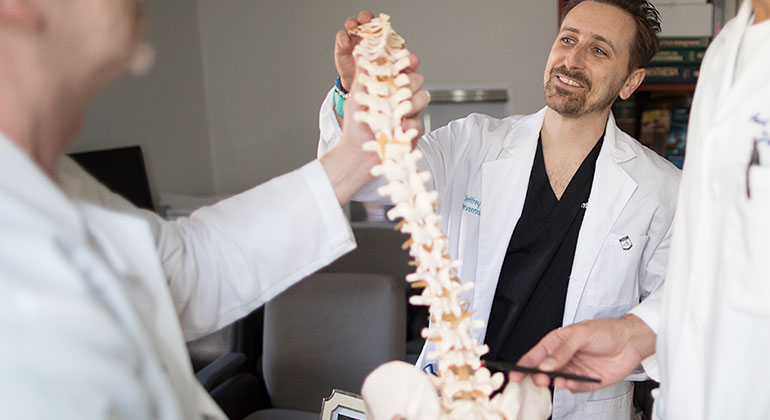Hip Pain

If you’re feeling discomfort in your thigh, buttocks, groin, or the inside or outside of your hip joint, you want relief. Hip pain can be caused by a variety of conditions. If rest, ice, heat, and over-the counter medications don’t help, you need expert help. Sometimes, hip pain starts elsewhere in your body—such as your back or groin—and radiates out to your hip. Often, hip flexor pain comes from repetitive motion or overuse. It can also stem from gluteal amnesia (also called “dead butt syndrome”) that happens when you sit for an extended period of time and your gluteal muscles “forget” how to work properly. Some people develop a limp from hip pain. At Mount Sinai, we start to treat hip pain by developing a precise diagnosis.
Conditions We Treat
A number of conditions can give you hip pain. The ones we see most often include the following:
- Arthritis causes inflammation in the hip, which leads to pain, stiffness, and reduced range of motion. The most common culprits of hip pain are juvenile idiopathic arthritis, osteoarthritis, psoriatic arthritis, rheumatoid arthritis, and septic arthritis. Arthritis is more common in middle-aged and older adults, particularly among women. Severe arthritis can be difficult to treat and often requires the surgical replacement of your joint. Our anti-inflammatory approach can allow you to delay or even prevent the need for an operation
- Bursitis happens when the sacs of liquid between the bone, muscle, and tendons become inflamed. These sacs, called bursae, protect our bones from rubbing against each other, which can be painful. You may feel this when you move your hip joint. Bursitis often stems from repetitive activities. This condition may be debilitating with a long recovery time. For tough cases or the hard-working person who needs to remain active, we can successfully treat this condition quickly by removing hip fluid that causes inflammation and targeted anti-inflammatory injections
- Labral tear is when you develop a rip in the ring of cartilage around your hip socket. This cartilage, called the labrum, cushions your hip joint and keeps your thigh bone secure in your hip socket. If you perform a lot of twisting motions, you might develop this condition. We can help to diagnose and treat you and get you back to participating in the activities that you enjoy
- Muscle or tendon sprain or strain are caused by repetitive motion. When your muscles or tendons became inflamed, they cause pain and make it hard for your hip to function normally
- Pinched nerves, including meralgia paresthica, sacroliitis, and sciatica can cause hip pain. Sciatica, for instance, leads to pain in the back or your hip, which can travel down to your buttock and legs
- Tendonitis is when your tendons become inflamed. Tendons are the thick bands of tissue that connect our bones to our muscles. Tendonitis often stems from repetitive activity
Treatments We Offer
We treat hip pain in different ways, depending on the diagnosis.
- Anti-inflammatory medications: These include corticosteroids and nonsteroidal anti-inflammatory drugs (NSAIDs), and can help with rheumatoid arthritis. NSAIDs include aspirin, ibuprofen, and naproxen
- Pain medication: These can help if your pain comes from a strain, tendonitis, or osteoarthritis. We recommend over-the-counter medications such as acetaminophen (Tylenol) or a nonsteroidal anti-inflammatory (such as ibuprofen or naproxen). We rarely if ever use opioids
- Physical therapy: This approach is useful for arthritis and some other conditions. A physical therapist can teach you stretches and exercises to strengthen your core muscles, reduce pain, and increase your range of motion. We focus especially on strengthening your gluteal muscles. When your muscles are stronger, your pelvis is better aligned, which causes less stress and pain on the hip







